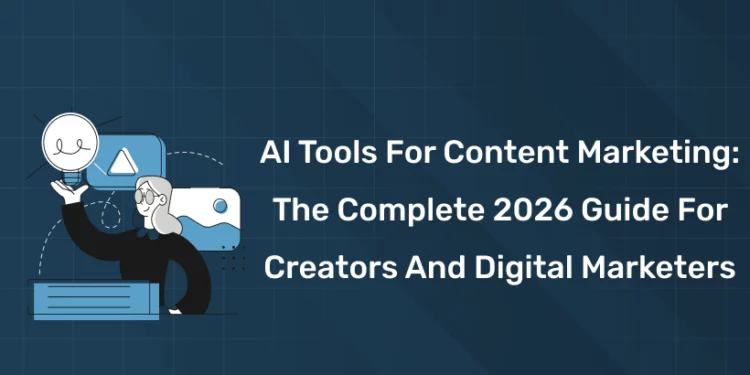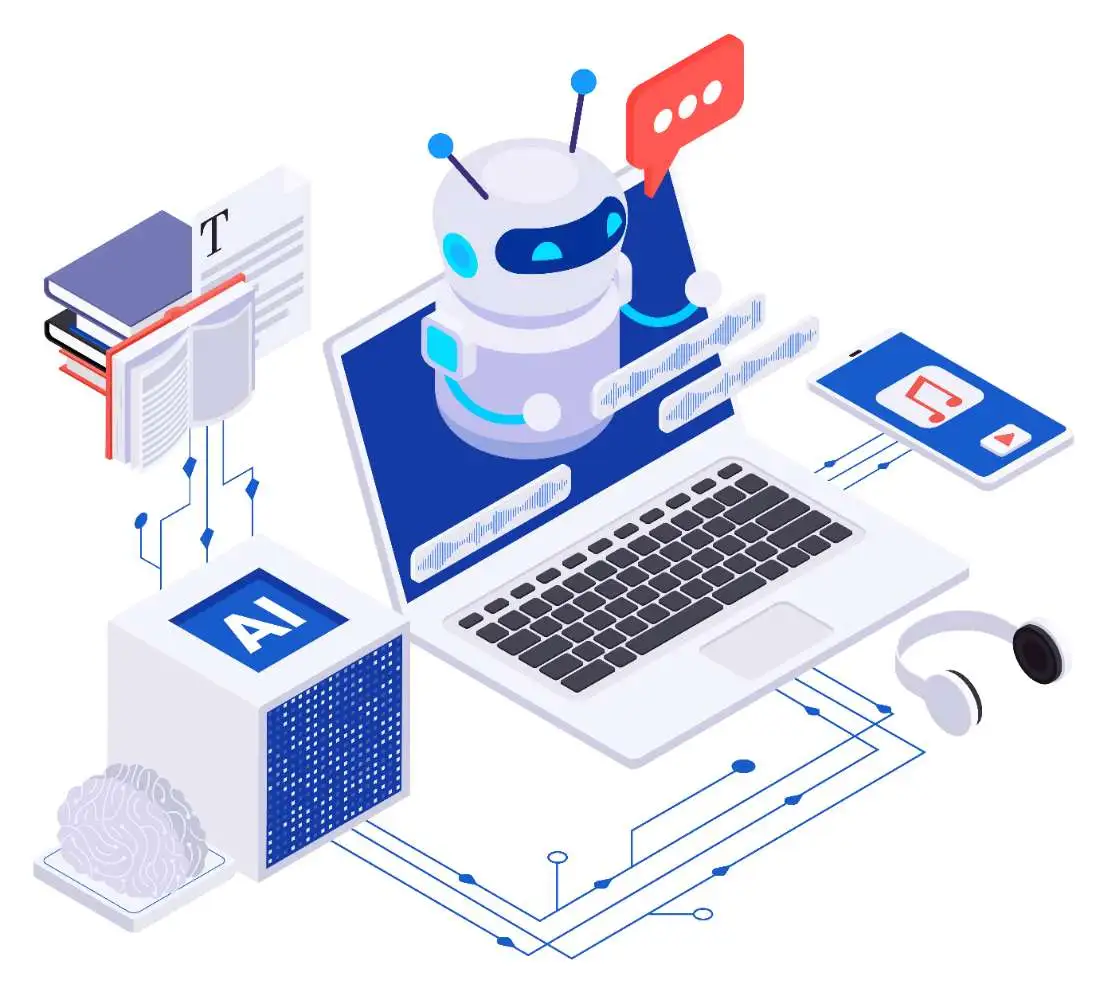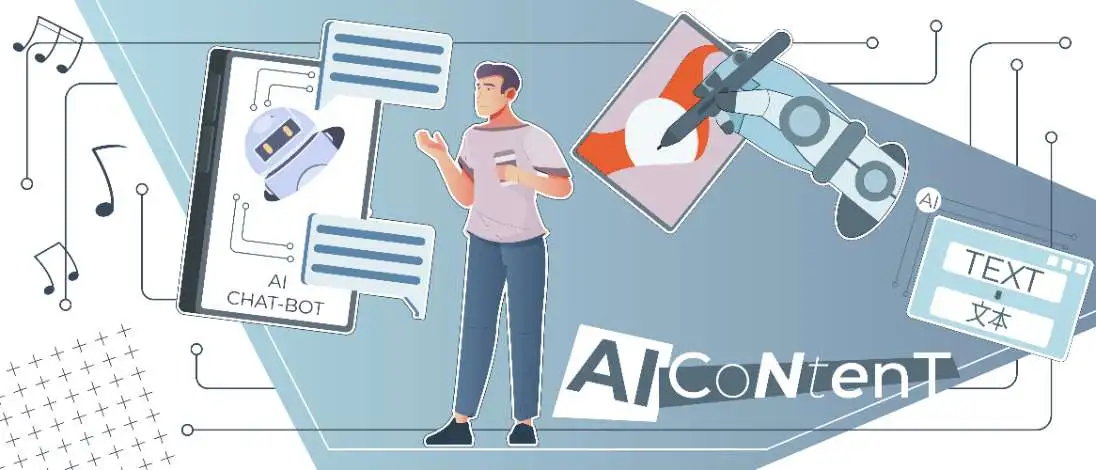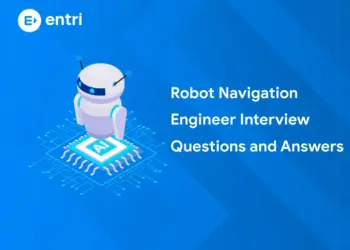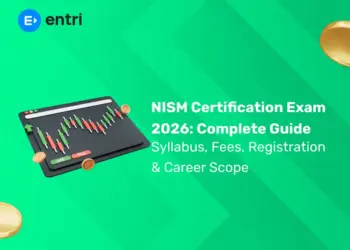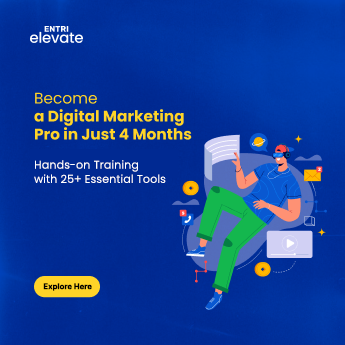Table of Contents
AI is no longer a fancy buzzword in content marketing. It’s quietly running idea generation, blog drafts, social media captions, YouTube scripts, ad copies, email subject lines, and even content performance reports in the background of most serious marketing teams.
If you’re a beginner, a freelancer, or a working digital marketer, you’ve probably felt this mix of emotions:
“AI looks powerful… but which tools do I actually need? And will it replace me?”
Short answer:
AI won’t replace good marketers – but marketers who use AI smartly will definitely replace those who don’t.
This blog walks you through AI tools for content marketing, how they fit into each stage of your content workflow, and how to use them without losing your unique voice. We’ll also see how structured learning, like the Entri AI-powered Digital Marketing Course, can help you turn these tools into a real career advantage rather than random experiments.
Key Takeaways
- AI tools can help with every stage of content marketing: research, planning, writing, design, distribution, and analytics.
- You don’t need 50 tools – a thoughtful stack of 5–7 AI tools is enough to cover 80% of your needs.
- AI is great for first drafts, brainstorming and optimisation, but humans are still crucial for strategy, creativity and brand voice.
- Indian and global brands increasingly expect marketers to be AI-literate, not just “good writers.”
- Courses like the Entri AI-powered Digital Marketing Course can help you learn how to practically apply AI tools in SEO, SMM, content, and performance marketing, not just press “generate”.
Why AI and Content Marketing Are a Perfect Match
1: What is the primary goal of SEO (Search Engine Optimization)?
Content marketing has always had the same core challenges:
- “What should we post this week?”
- “How do we rank on Google with limited time?”
- “How do we repurpose content across platforms?”
- “How do we prove content is working?”
AI tools directly attack these pain points:
- They analyse huge amounts of data (keywords, trends, engagement) in seconds.
- They help you create more content in less time.
- They allow a solo creator or small team to act like a big content department.
Instead of replacing your skills, AI works more like:
- A research assistant
- A junior writer
- A rough designer
- A data analyst
You’re still the editor, strategist and decision-maker.
Become an AI-powered Digital Marketing Expert
Master AI-Driven Digital Marketing: Learn Core Skills and Tools to Lead the Industry!
Explore CourseThe Content Marketing Workflow – and Where AI Fits
It helps to see AI tools by stage, rather than as random apps.
Typical content marketing workflow:
- Research & Strategy – audience, keywords, competitors
- Content Planning – topics, calendar, formats
- Writing & Creation – blogs, scripts, posts, emails
- Design & Visuals – thumbnails, creatives, carousels
- SEO & Optimisation – on-page checks, readability, structure
- Publishing & Distribution – repurposing, scheduling
- Analytics & Improvement – what worked, what didn’t
Now let’s plug AI into each step.
AI Tools for Research & Strategy
Before you write anything, you need to know what people care about and what they search for.
a) Keyword & Topic Research Tools
- SEO Suites with AI assistance (like SEMrush, Ahrefs, or similar tools)
- Suggest keyword clusters, search volumes, and difficulty.
- Many now offer “AI content ideas” based on SERP analysis.
- Suggest keyword clusters, search volumes, and difficulty.
- AI-driven topic tools
- Can generate topic clusters like:
- “AI tools for SEO”
- “AI tools for SMM”
- “AI tools for PPC”
- “AI content tools for small businesses”
- “AI tools for SEO”
- Can generate topic clusters like:
How to use them practically:
- Take your seed topic: e.g., “digital marketing in India.”
- Use an SEO + AI tool to:
- Find long-tail keywords like “AI tools for content marketing in India” or “best AI tools for small business content.”
- Map content into pillar + cluster structure (like your main blog “AI tools for marketers” and child blogs like AI for SEO, SMM, PPC, content, etc.).
- Find long-tail keywords like “AI tools for content marketing in India” or “best AI tools for small business content.”
This is exactly the kind of structured approach many advanced marketers learn in programs like the Entri AI-powered Digital Marketing Course, where AI is integrated into keyword research, content mapping and campaign planning.
Join Our Online Digital Marketing Course & Learn the Fundamentals!
AI Tools for Content Planning & Ideation
You’ve got your keywords. Now you need actual ideas.
a) AI Idea Generators
Generative AI tools can:
- Turn a general theme into dozens of blog ideas.
- Suggest content angles for different audiences (students, working professionals, founders).
- Help brainstorm hooks, headlines and subheadings.
Example prompt you might use:
“Give me 20 blog ideas on AI tools for content marketing for Indian small businesses, grouped by awareness level (beginner / intermediate / advanced).”
b) AI-Powered Content Calendars
Some marketing platforms now use AI to:
- Suggest posting schedules (best days/times).
- Recommend content themes per week.
- Automatically add hashtags and short captions for social posts.
How this helps you:
- You stop staring at a blank Notion or Excel sheet.
- You get a monthly content calendar in minutes, which you can then refine with your own judgment.
Become an AI-powered Digital Marketing Expert
Master AI-Driven Digital Marketing: Learn Core Skills and Tools to Lead the Industry!
Explore CourseAI Tools for Writing: Blogs, Social Posts, Scripts & Emails
This is where most people first meet AI tools.
a) AI Writing Assistants
AI writing tools can help you with:
- Blog outlines
- First drafts
- Meta descriptions
- Social captions
- Email subject lines & body copy
- Video / podcast scripts
The trick is not to publish the raw output, but to:
- Use AI for the heavy lifting: structure, first draft, ideas.
- Then edit like a pro: add your stories, data, cultural context, and brand tone.
b) How to Write with AI Without Losing Your Voice
Here’s a simple workflow:
- Plan manually + with AI
- Decide your main angle and key points first.
- Generate section-wise, not full-article dumps
- Ask AI to help with individual sections: intro, FAQ, examples.
- Add your own:
- Personal experience
- Local references (Indian brands, rupee context, local platforms)
- Opinions and recommendations
- Personal experience
- Run a quick human editing pass
- Check grammar, flow, tone and factual accuracy.
- Check grammar, flow, tone and factual accuracy.
Done right, your article feels human-led, AI-assisted, not robotic.
This “human-first, AI-assisted” method is exactly what good digital marketing trainers, including mentors in Entri’s AI-powered Digital Marketing Course, now emphasise. You learn how to control AI, instead of letting it control your content.
AI Tools for Visual Content & Design
Content marketing isn’t just about written text. Visuals are crucial.
a) AI Image & Design Tools
AI design tools can:
- Generate featured images, simple illustrations, or abstract backgrounds.
- Help you create social media creatives, carousels, and thumbnails with templates plus smart suggestions.
- Remove backgrounds, enhance quality, or match brand colours.
b) Practical Uses for Marketers
- Turn a blog into 5–10 social posts:
- One quote graphic
- One statistic graphic
- One “Before vs After using AI tools” visual
- One quote graphic
- Design a thumbnail for a YouTube video on “AI tools for content marketing in 2026.”
Even if you are not a graphic designer, AI design tools help you maintain a clean, professional, on-brand look.
AI Tools for SEO & Content Optimisation
Once the content is written, you need to ensure it:
- Is easy to understand
- Follows SEO best practices
- Answers search intent
a) AI SEO Assistants
These tools can:
- Suggest better title tags and meta descriptions.
- Check keyword placement and semantic coverage.
- Analyse top-ranking pages and tell you what your content is missing.
b) Readability and Tone Checkers
AI writing tools can:
- Adjust tone (formal, friendly, educational).
- Shorten complex sentences.
- Highlight overused phrases or passive voice.
This is especially useful if you’re writing for mixed audiences – for example, both beginners and working professionals in India who may prefer clear, simple, practical language.
AI Tools for Repurposing & Distribution
One of AI’s biggest gifts to content marketers: repurposing.
You don’t have to create 10 different pieces of content from scratch. You can:
- Turn a long blog into:
- Instagram carousels
- LinkedIn posts
- A short script for a Reel or YouTube Short
- Email newsletter snippets
- Instagram carousels
Some AI tools specialise in:
- Summarising long content
- Converting text to scripts
- Turning transcripts into articles
- Suggesting social angles from a blog
For a working professional or a solo creator, this is gold. You can show up consistently across platforms without burning out.
AI Tools for Analytics & Improvement
Content marketing without data is guesswork.
a) AI-Powered Analytics Helpers
These tools can:
- Pull data from platforms (website, email, social).
- Summarise performance in simple language:
- “These 3 blog topics got the highest organic traffic.”
- “These Reels had the highest watch time.”
- “These 3 blog topics got the highest organic traffic.”
- Suggest next-step actions:
- “Create more how-to posts on AI tools for content.”
- “Double down on carousel format for LinkedIn.”
- “Create more how-to posts on AI tools for content.”
b) Predictive Content Ideas
Some tools even forecast:
- Topics likely to trend
- Content formats that might perform better
- Best posting times for specific audiences
You’re no longer reacting; you’re planning data-informed content.
Common Mistakes to Avoid with AI Content Tools
AI is powerful, but it’s not magic. Watch out for these traps:
- Publishing raw AI output
- It often sounds generic, may contain factual errors, and might not match your brand tone.
- Over-optimising for keywords, under-optimising for humans
- Google and readers reward helpful, readable content, not keyword-stuffed paragraphs.
- Ignoring brand and audience
- A tool doesn’t know your brand history and promise unless you train it.
- Relying on one tool for everything
- Use a stack: research tool + writing assistant + SEO checker + analytics helper.
- Not updating skills
- AI tools evolve quickly. Learning how to work with the latest updates is crucial for staying relevant as a marketer.
- AI tools evolve quickly. Learning how to work with the latest updates is crucial for staying relevant as a marketer.
How Entri’s AI-Powered Digital Marketing Course Fits into This Picture
If you feel overwhelmed by which AI tools to pick and how to use them strategically, that’s normal.
Randomly trying tools can waste time. What you need is:
- A structured roadmap
- Guided practice
- Real-world projects
That’s where programs like the Entri AI-powered Digital Marketing Course come in.
For students, working professionals, and freelancers across India, this kind of practical exposure is what turns AI from an intimidating trend into a career-boosting skillset.
Key Takeaways – AI Tools for Content Marketing in 2026
Let’s summarise the big points:
- AI is your assistant, not your replacement. Use it for ideas, drafts, design support and data analysis – but keep strategy and storytelling human.
- Focus on building a small, powerful AI toolkit that supports research, writing, visuals, SEO, repurposing, and analytics.
- Always edit AI output, add your voice, local context (like Indian market realities), and unique insights.
- Learn to use AI tools end-to-end in real campaigns – that’s what employers look for now.
- A structured learning path, like the Entri AI-powered Digital Marketing Course, can help you go from “I know some tools” to “I can run full AI-assisted content campaigns confidently.”
Final Word
We are entering a phase where every content marketer is expected to be AI-aware. The people who will stand out are not those who ignore AI or blindly depend on it, but those who can blend AI efficiency with human creativity and empathy.
If you’re serious about growing as a content creator or digital marketer, this is the right time to:
- Experiment with AI tools
- Learn best practices
- Build a workflow that saves time
- And invest in guided learning that teaches you not just which tools exist, but how to use them intelligently.
Your content doesn’t need to fight AI. It just needs you to team up with it, smartly.
Also check out:
- Entri’s Resume Builder to craft industry-ready, ATS-optimised resumes tailored for digital marketing and AI-related roles.
- Prepare for interviews with Entri’s AI Interview Preparation App, which simulates real-world interview questions and gives instant, data-backed feedback to improve your confidence and communication skills.
Frequently Asked Questions
What are AI tools for content marketing?
AI tools for content marketing are software systems that help automate writing, research, SEO optimisation, analytics, and content planning using artificial intelligence.
How do AI tools benefit content marketers?
They reduce time spent on research, help with topic generation, optimise keywords, improve grammar, enhance creativity, and boost overall productivity.
Which AI tools are best for content planning?
Tools like Notion AI, Frase, Jasper, MarketMuse, and ContentShake assist with topic ideation, briefs, clustering, and strategy planning.
Can AI write complete blog posts?
Yes, AI can generate drafts, outlines, and multiple versions of a blog, but human editing ensures personalisation, accuracy, and brand tone.
Are AI tools helpful for SEO optimisation?
Absolutely. Tools like Surfer SEO, NeuronWriter, and Clearscope analyse top-ranking pages and assist in keyword optimisation and content structuring.
Do AI tools replace human content writers?
No. AI enhances productivity but cannot replace human creativity, context understanding, and storytelling skills, especially in marketing.
How can beginners learn AI-based content marketing?
Beginners can join structured training programs like the Entri AI-Powered Digital Marketing Course, which teaches practical AI tools used in real-time campaigns.
Can AI improve content quality and engagement?
Yes. AI helps identify trending topics, optimise readability, improve grammar, and craft more engaging copy based on data insights.


